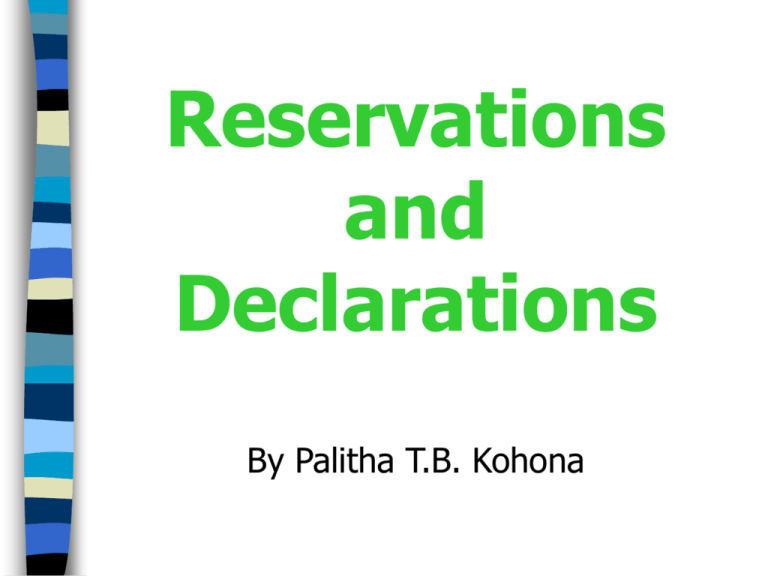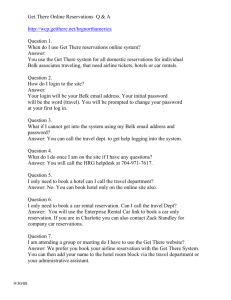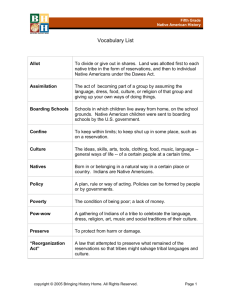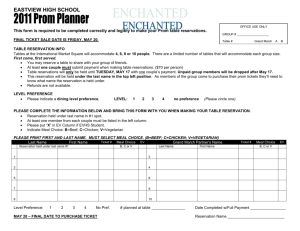
Reservations
and
Declarations
By Palitha T.B. Kohona
Reservations
Why Are Reservations
Important?
Enable a state to participate in a treaty in which it
would not be able to participate due to an unacceptable
provision or provisions.
But treaties are the result of meticulous negotiations
–take a long time to negotiate
-the common denominating factors are explored
-many concessions made
- compromises achieved.
Would it be a reflection of a lack of good faith to lodge a
reservation?
What Are Reservations?
Unilateral statements made upon signature, ratification,
acceptance, approval of or accession to a treaty.
-However phrased or named, any statement purporting to
exclude or modify the legal effect of a treaty.
-Entitled “reservation”, “declaration”, “understanding”,
“interpretative declaration” or “interpretative statement”.
States make formal statements at the time of signature,
ratification, accession, etc.
-Usually, such statements do not pose a problem.
-They are usually clear.
But problems arise when there is a lack of clarity.
(Article 2(1)(d) of the Vienna Convention 1969)
Who can formulate a
reservation?
In the Secretary-General’s practice, only the Head of State or
Government or the Foreign Minister
- (or someone acting in that position or exercising delegated
powers).
o A reservation is a limitation on the commitment undertaken by a
state.
o Only the same authorities who can undertake a treaty action can
formulate a reservation.
o The SG also will not allow a permanent representative to lodge a
reservation.
Exception: some permanent representatives who possess
general full powers (such as the UK and China) can lodge
reservations.
The Special Rapporteur also endorses this approach.
Recognizes it as a practice of the particular depositary.
Reservation made on
signature
If made upon simple signature it is merely
declaratory.
o Must be formally confirmed in writing on ratification or
acceptance.
If made on definitive signature, it need not be
confirmed later.
(Art. 23(2), Vienna Convention, 1969)
Time for Formulating Reservations
Article 19 VCLT: A State may, when signing, ratifying, accepting,
approving or acceding to a treaty, make a reservation unless:
(a) The reservation is prohibited by the treaty;
(b) The treaty provides that only specified reservations, which
do not include the reservation in question, may be made; or
(c) The reservation is incompatible with the object and
purpose of the treaty.
In order to comply with this, some countries have denounced
treaties and reacceded
• in order to lodge reservations.
This approach has been criticised by other countries.
Form of Reservations
It is a limitation on the commitment undertaken by the State.
Must, therefore, be included in the instrument of ratification,
acceptance, approval or accession or be annexed to it.
If separate, it must be signed by the Head of State, Head of
Government or Minister for Foreign Affairs
- or a person having full powers for that purpose issued by one of the
above authorities.
Treaty Provisions on Reservations
Some treaties specifically prohibit
reservations.
• E.g., Art. 120, ICC Statute
• Art. 18, Montreal Protocol
Territorial Exclusions –
Are they Reservations?
Some States exclude parts of the territory from the application
of treaties:
– For example, United Kingdom, Netherlands, Denmark, New
Zealand and, in some instances, China.
– In most cases non-metropolitan territories (except China).
Not consistent with art. 29 VCLT
– But is treated by the Secretary-General as a regional
practice.
- No objections by other states.
- These states continue to engage in this practice.
– Why?
Compliance with domestic legal procedures.
These require consultations, which would take time.
Prof. Pellet does not endorse this approach.
The Depositary’s Role
He has to exercise his role impartially.
– The S-G has also sought to avoid controversy.
Where a treaty expressly prohibits reservations:
• The depositary makes a preliminary legal assessment
whether a statement constitutes a reservation.
– If it has no bearing on the State’s legal obligations, the
depositary circulates the statement.
– If it excludes or modifies the legal effects of provisions
of the treaty, the depositary will draw the attention of
the State concerned to the issue
» will not circulate the unauthorised reservation.
The depositary is guided by the Treaty itself.
– Where the Secretary-General requests a clarification and the
state confirms the absence of a reservation
» the State is estopped from relying on the
statement as a reservation.
– Such statement not being a reservation, the SecretaryGeneral will formally receive the instrument in deposit
and circulate it.
Case Study
E.g., Montreal Protocol on Substances that Deplete the
Ozone Layer – China made a declaration in 1999 on
Macao returning to China
China assumed responsibility for Macao in 1999
- Macao was considered to be developed entity under
Portugal – falling under art. 2, Montreal
Protocol
- Art.2 allowed a shorter time period for developed
countries to phase out ozone depleting
substances.
- China being a developing country had a longer period
for
the phase out under art. 5.
China declared that it will not extend art. 5 to Macao
Art. 18 prohibits reservations
- after much consultation China’s statement was
circulated.
No objections were received.
Treaty Expressly Authorises Reservations
Where a State formulates a reservation that is
authorised, the Secretary-General informs the States
concerned.
– Unless a translation or an in-depth analysis is
required, such a notification is processed and
transmitted by e-mail on the date of formulation.
– Such reservation does not require any subsequent
acceptance by the States concerned.
Treaty Is Silent on Reservations
Where a treaty is silent on reservations and a State formulates a
reservation,
– the depositary informs the States concerned.
• Such reservation should be consistent with art. 19 VCLT
• Should be consistent with the object and purpose
• Unless a state objects within 12 months, it is presumed
to have accepted the reservation.
– Generally, in human rights treaties
Prof. Pellet discusses this issue
– This presumption is a problem for many small states.
– Supports the Secretary-General drawing the attention of
States to a prohibited reservation.
– Some smaller states have endorsed this proposal
– Many foreign ministries do not have the resources to
examine reservations.
Not all States agree with proposal.
Who Decides Whether a Reservation Is
Consistent With the Object and Purpose?
Whether consistent with the object and purpose:
– Human rights bodies?- Have tried to take over this role.
– Criticized by states.
– Depositary?
– Pellet and some states see a role for the depository.
– States Parties?
A debate continues.
– The Secretary-General will continue with the current practice
unless States agree otherwise.
There may be a compromise.
– Human rights bodies could draw the attention of states to a
difficult reservation.
– States themselves will decide to object.
Case Study – ICESCR
Declaration which could be a reservation (where the treaty is
silent).
– China made a declaration on becoming party to the ICESCR
• limiting the right of Hong Kong trade unions to
confederate.
– Depositary did not pass judgment on this and circulated the
declaration.
– A number of countries have objected.
Objections to Reservations
Time for making objections:
– Where a treaty is silent, and a reservation has been
circulated:
• States concerned have 12 months to object, beginning
– on the date of the depositary notification or
– on the date on which the State expressed its consent
to be bound by the treaty.
(See art. 20 (5) VCLT)
– An objection lodged after the end of the 12-month period is
circulated as a “communication”.
• The legal effect is uncertain but may have a political
effect.
– Notifications are circulated by e-mail and paper format
Case Study – ICCPR and CEDAW
Many States have formulated reservations to the
• International Covenant on Civil and Political
Rights, 1966
• the Convention on the Elimination of All Forms
of Discrimination against Women, 1979.
• These reservations have attracted a wide range
of objections.
Effect of Objections
Effect of objections on entry into force:
– An objection “… does not preclude the entry into force
of the treaty ... unless a contrary intention is definitely
expressed by the objecting State”.
• To avoid uncertainty, an objecting State specifies whether
its objection precludes the entry into force.
– If a State does not object to a reservation made by
another State, it is deemed to have tacitly accepted the
reservation.
– An objection need not be signed by one of the
recognized authorities.
Withdrawal of a Reservation
A State may withdraw its reservation completely or partially
at any time.
– The consent of the States concerned is not necessary.
– Must be formulated in writing and signed by the Head of
State, Head of Government or Minister for Foreign Affairs
• or a person acting in that capacity or having delegated authority
for that purpose issued by one of the above authorities.
– The Secretary-General circulates a notification of a
withdrawal.
Objections can be withdrawn at any time also.
Art. 22(3) VCLT: a withdrawal of a reservation becomes
operative only when a concerned State has been notified.
Late Reservations
Formulating reservations after ratification, acceptance,
approval or accession:
– Although not consistent with art.19, the Secretary-General
circulates such reservation.
– Accepts the reservation in deposit only if no such State
objects:
• On the basis that
- States have an inherent right to modify treaty relations
- But such modification must receive unanimous
acceptance.
– The Secretary-General’s practice deviates from the strict
requirements of the Vienna Convention.
Time Limit for Objections
to Late Reservations
12 months from the date of the depositary notification.
– Originally 90 days.
● Was inadequate for states to complete their analyses and
informal consultations
● Some states may have used this approach to sneak in
reservations
Same where a State withdraws an initial reservation and
substitutes it with a new or modified reservation.
Prof. Pellet’s report endorses the Secretary-General’s practice.
Modifications to Reservations
An existing reservation may be modified so as to result in a
partial withdrawal or to create new exemptions.
– A modification of the latter kind has the nature of a new
reservation.
– The Secretary-General circulates such modifications and
grants the States concerned a specific period within
which to object to them.
In the past, the practice as depositary had been to stipulate
90 days.
On 4 April 2000, it was advised that the time provided for
objections to modifications would be 12 months.
Declarations
Interpretative Declarations
A State may make a declaration about its understanding of a
matter contained in or the interpretation of a particular
provision in a treaty.
– Declarations are statements that do not purport to exclude
or modify the legal effects of a treaty.
– Some treaties specifically provide for interpretative
declarations.
Optional and Mandatory Declarations
Treaties may provide for States to make optional and/or
mandatory declarations.
–
–
These are legally binding.
Must be signed by Head of State, Government, MFA.
Optional Declarations
Many human rights treaties provide for optional declarations.
– Relate to the competence of human rights commissions or
committees.
Mandatory Declarations
– Where a treaty requires States becoming party to make a
mandatory declaration, the Secretary-General seeks to
ensure that they make such declarations.
• Need to be signed by proper authorities.
• Some disarmament and human rights treaties.
Time for Formulating Declarations
Declarations are usually deposited at the time of signature
or at the time of deposit of the instrument of ratification,
acceptance, approval or accession.
» Sometimes, subsequently depending on the
treaty provisions.
Form of Declarations
Normally need not be signed by a formal authority.
Preferably signed by the Head of State, Head of Government or
Minister for Foreign Affairs.
– or a person acting in that capacity or exercising delegated powers
for that purpose issued by one of the above authorities.
– This practice avoids complications in the event of a doubt
whether the declaration in fact constitutes a reservation.
But optional and mandatory declarations impose legal
obligations on the declarant.
– Must be signed by the Head of State, Head of Government
or Minister for Foreign Affairs
» or by a person acting in that capacity or exercising delegated
powers for that purpose.
Notification of Declarations by the
Depositary
The Secretary-General reviews all declarations to treaties that
prohibit reservations
– to ensure that they are prima facie not reservations.
Where a treaty is silent or authorises reservations, the
Secretary-General makes no determination.
– The text is simply communicated to all States concerned
• States draw their own legal conclusions.
Objections to Declarations
Where the treaty is silent on reservations:
–
States sometimes object to declarations relating to a
treaty that is silent on reservations.
–
The Secretary-General circulates any such objection.
Copyright Notice
Copyright 2005 by the United Nations. All
rights reserved. Printed in the United States
of America. No part of this publication may
be reproduced, stored in a retrieval system,
or transmitted in any form by any means, i.e.,
electronic, mechanical, photocopying,
recording, or otherwise, without the written
permission of the United Nations.





